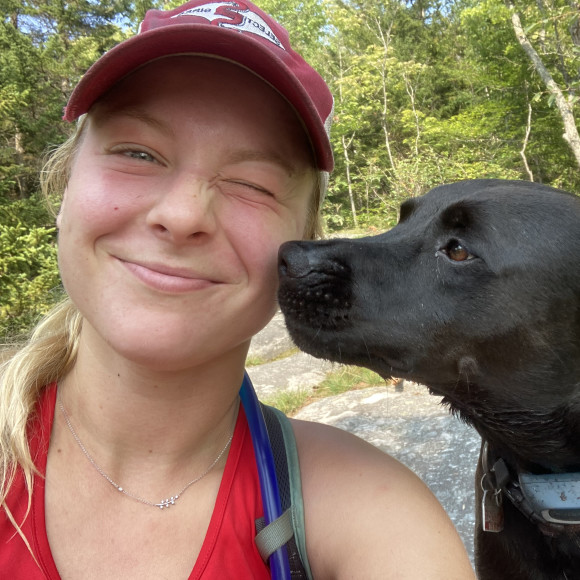We Imagine a Vermont Where:
- A young person serving in a local climate corps or flood response team earns industry-recognized credentials and college credits.
- A recent high school graduate who spends a year supporting youth programs is supported through a Registered Apprenticeship program toward teacher licensure.
- Volunteer firefighters and disaster responders are supported to build pathways into public safety and emergency management careers.
- Employers see service alumni as their next generation of skilled workers—and co-invest to sustain these programs.
This isn’t just about jobs. It’s about economic mobility, civic engagement, community resilience, and neighbors helping neighbors—aligned to strengthen Vermont’s future.
Building a Sustainable System
The Vermont Service-to-Career Pathways Convening in September 2025 was a starting point for this work. Leaders from state agencies, schools, employers, service programs, municipalities, and philanthropy came together to:
- Map the Landscape
- Understand Vermont’s current service ecosystem, the impact of federal funding cuts, and the urgent workforce needs in healthcare, education, the trades, and climate resilience.
- Hear stories from people whose own journeys show how service can open doors.
- Envision a Statewide Framework
- Design a system that is less dependent on volatile federal dollars.
- Build stronger local programs that connect rural and underrepresented youth to opportunity.
- Ensure employers are active partners who recognize the value of service-trained workers.
- Spark Action and Innovation
- Identify resources and opportunities to connect existing programs and funding streams.
- Explore pilots and models tied to Vermont’s most pressing needs.
- Link Career & Technical Education, apprenticeships, and higher education to service pathways.
- Leverage philanthropy to seed new ideas and inform public policy.
The Bigger Picture
Service-to-career pathways are more than a workforce strategy. They:
- Empower individuals by turning acts of service into career credentials and long-term opportunity.
- Strengthen communities by aligning service with local needs and building civic pride.
- Grow Vermont’s economy by supporting relocation of ambitious and caring people, supporting the retention of people growing up here, and ensuring a steady pipeline of skilled workers in critical sectors.
By linking service programs and systems to career pathways, Vermont can set an example for how small states build big futures—rooted in community, resilience, and opportunity for all. We invite your ideas about roles for philanthropy to help align service, education, and workforce systems into a bold, sustainable model that ensures every act of service strengthens both the individual and the state we call home.
Illuminating Pathways from Service to Career
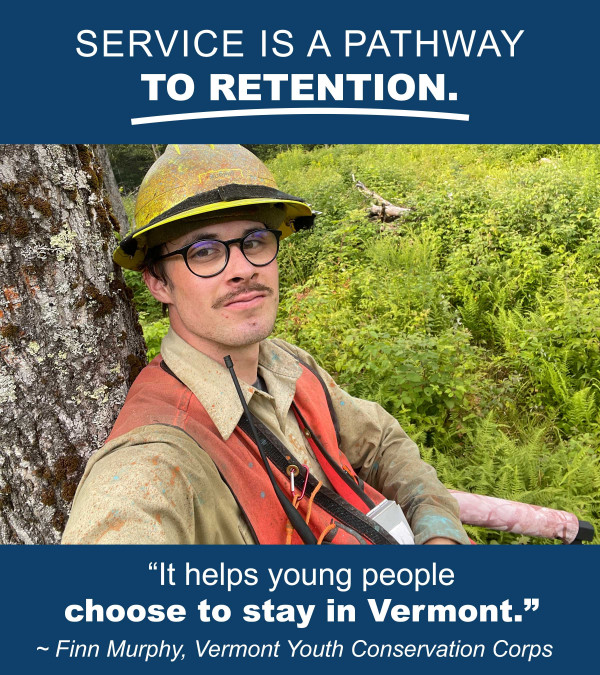
Finn Murphy first joined the Vermont Youth Conservation Corps (VYCC) as a teenager. “I loved being outside and supporting good land stewardship,” he says. “VYCC showed me there was a real path where you could build a career doing that kind of work.”
Growing up in Elmore, he spent hours building mountain bike trails on his own. VYCC gave him the chance to turn that interest into service—building trails, removing invasive species, and supporting conservation projects. “It felt good to know the work mattered, even if people wouldn’t always see it right away.” Those experiences opened doors to seasonal trail crew jobs in the White Mountains and Adirondacks.
Now a forestry student at the University of Vermont, Finn works seasonally as a Forestry Specialist with the Vermont Department of Forests, Parks, and Recreation through a partnership with the U.S. Forest Service. His work in the Green Mountain National Forest focused on timber stand improvements to restore forest health and resilience.
He developed technical skills like timber cruising and wetland delineation and also a clearer sense of his career path. “I’ve always learned best by being outside, doing the work. Service gave me that, and it also showed me the bigger picture of where I want to go.”
Looking ahead, Finn hopes to stay in Vermont, keep building his skills, and help expand service opportunities for others. “Programs like VYCC and AmeriCorps don’t just build skills—they help young people choose to stay in Vermont and contribute to its future.”
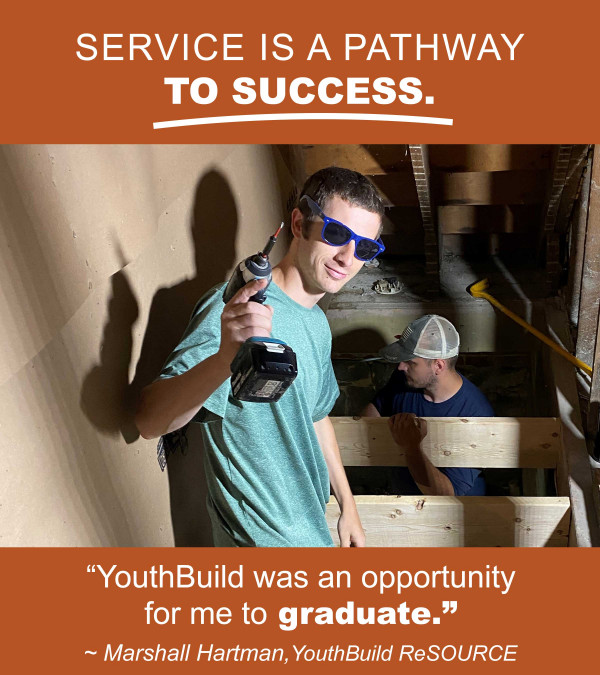
Marshall Hartman doesn’t have to search far to find empathy for the flood victims whose homes he’s helping to rebuild in Barre, Vermont. His own home was damaged by flooding in 2023, leaving him feeling overwhelmed. “Everything is more complicated than it seems. It’s very stressful.”
Hartman’s path to a career in construction began while he was a student at Williamstown High School. He enrolled in YouthBuild ReSOURCE, a 12-month program that allowed him to learn construction skills and earn his OSHA 10 Certificate, while working toward his high school diploma. His classroom? Homes in Barre that had been damaged by the 2023 flooding.
“Traditional learning isn’t for everyone,” said Hartman. “YouthBuild was an opportunity for me to graduate, which at the time didn’t seem possible, while learning trade skills and helping my community. I feel very fortunate.”
“There is such a lack of skilled construction tradesmen and laborers,” said Matt Russick, Hartman’s supervisor and ReSOURCE’s construction manager. “When the flooding happened, it was all hands on deck to muck out basements and pull out drywall, but then families just sat on waiting lists for a contractor."
“I’ve learned so much that I don’t think I would have anywhere else,” said Hartman.
The skills Hartman is learning on the job should serve him well for years to come. According to the 2023-2024 Most Promising Jobs Report put out by the McClure Foundation and the Vermont Department of Labor, Vermont is projected to have 4,460 job openings in carpentry alone over the next ten years, with many more in the construction field more broadly. Hartman has every intention of staying in the field and continuing to build his skills.
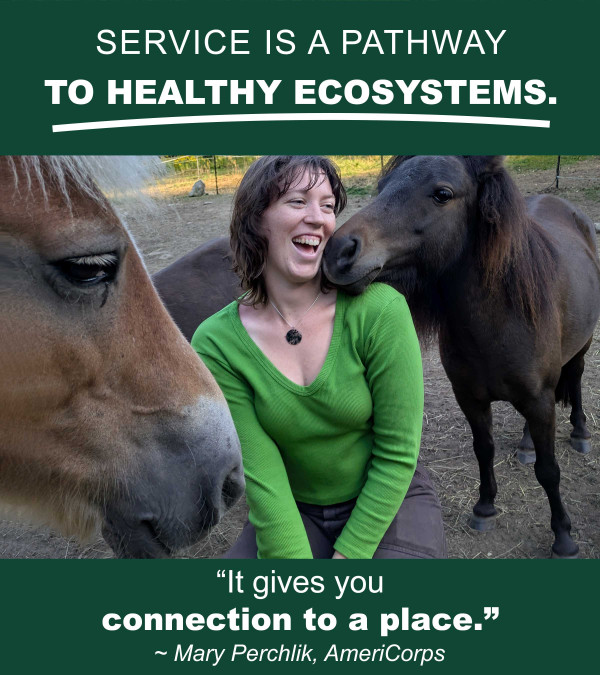
When Mary Perchlik returned home to Vermont after college, she was looking to put her environmental studies degree into action. AmeriCorps gave her that chance. She served two terms focused on water quality, first with the Department of Environmental Conservation (DEC) and then with the Vermont Natural Resources Council, where she worked alongside a team removing derelict dams to improve habitat, flood safety, and recreation.
The hands-on work gave her new skills ranging from data analysis and public outreach to the technicalities of restoring removing derelict dams. Along the way, Perchlik gained confidence and perspective. “I got to understand Vermont through a different lens and at a greater depth,” she said. “Service gave me an awareness of the natural world and how it’s impacted by the built environment.”
That experience set the stage for her career. Today, Perchlik promotes water quality as the Lake Champlain Basin Program Projects Specialist at DEC. She credits AmeriCorps with opening doors and grounding her work in service. “It gave me a strong sense of accomplishment and belonging,” she said. “It really gives you a connection to a place.”
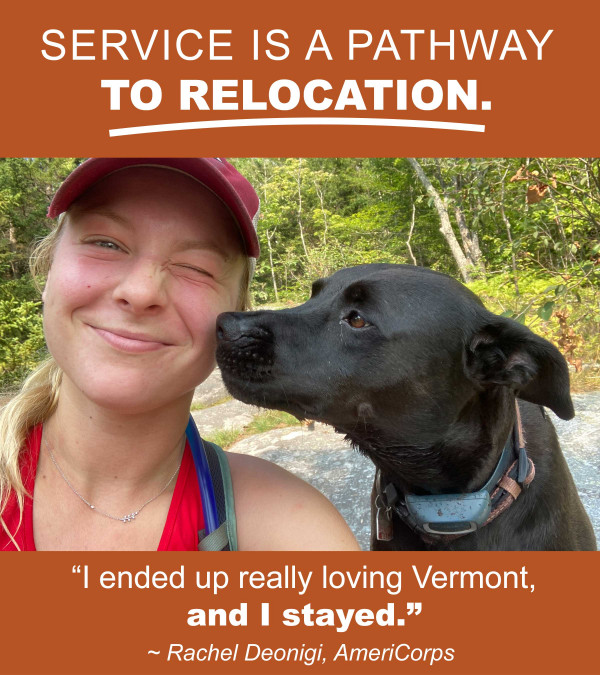
When she signed up for AmeriCorps, Rachel Deonigi hadn’t even been to Vermont before. “It was a risk,” she says. “But I ended up really loving it, and I stayed.” That decision set her on a path from a year of national service to a full-time role as a science teacher at a small rural public school in the Northeast Kingdom.
“I wanted to teach students about healthy eating and food systems, and AmeriCorps let me jump into the field without having to go back to school first. I could work right away.” She served with Green Mountain Farm-to-School (GMFTS), running school gardens and afterschool programs at three schools and building deep connections with staff, families, and other AmeriCorps members across the region.
That first year of service also helped her imagine a future she hadn’t previously considered: becoming a classroom teacher. “I had never imagined teaching in school, but once I got here and saw what public school actually looks like—and how natural science and outdoor education are part of the student experience—I realized how cool it was.”
She just finished her sixth year teaching middle school science at Albany Community School. Looking back, she sees national service as a powerful entry point—not only into a career but into community life. “When I did my service year, I met so many amazing young people who came here for host site jobs. Everybody gained so many skills and was doing really important work. Most of the people I know who came here for AmeriCorps have stayed.”
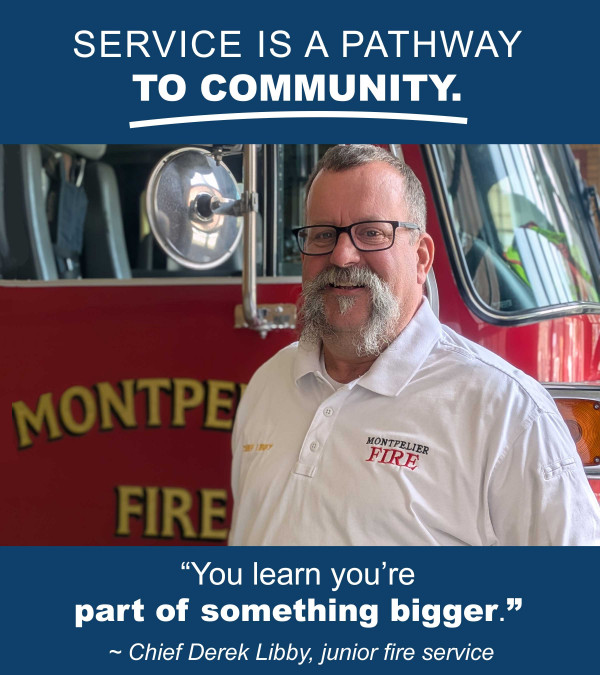
At 15, Derek Libby’s life took a turn when a Stowe firefighter asked if he’d considered joining the junior fire service.
Public service was already in his DNA. His parents helped start the Stowe Rescue Squad, his dad was police chief, his mom an ER nurse. “Service work—it’s about finding something that wakes you up in the morning,” Chief Libby said.
Libby volunteered for 14 years at Stowe Fire and Rescue, with many of those years also as a volunteer on Stowe Mountain Rescue. His service led to 25 years as a career fire fighter and Advanced EMT in Burlington. He became Montpelier’s fire chief in 2024. Libby built his career in firefighting and watched his son do the same.
“The Junior Fire Service lit a spark in him,” Chief Libby remembered. “He went to the Essex Town Fire Department, filled out a junior application—and now he’s a career firefighter in Williston.”
Junior firefighters, Libby explained, gain more than technical skills. “You learn a trade, you learn to interact with people, and for me, it created a pathway to a career,” he said. The work teaches responsibility, teamwork, and conflict resolution, while surrounding teens with mentors and giving them a sense of belonging. “You learn you’re part of something bigger than yourself.”
Chief Libby sees volunteer service as gateways that connect young people to role models, equip them with life skills, and opens the door to careers that strengthen their community.
As we learn alongside our partners, we invite ideas about roles for philanthropy to continue supporting career pathways in Vermont. Please reach out to Executive Director Carolyn Weir at cweir@vermontcf.org.
